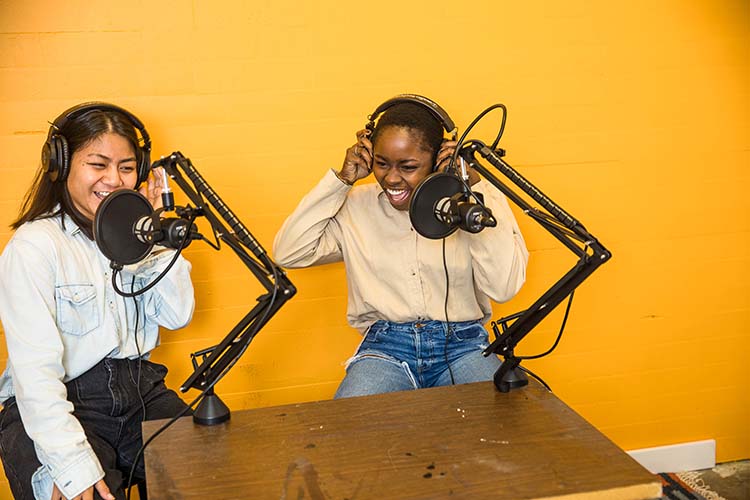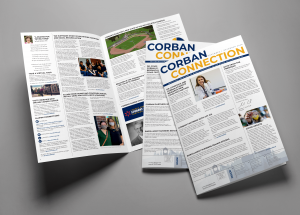When Professor of Media Arts, Naomi Yanike, first stepped foot into The Barn, her eyes instantly focused on a nondescript sign above one of the doors leading into a cluttered room. It held one word, “Studio.” It was a moment that launched a string of dreams for the space. “It felt a bit like foreshadowing of things to come,” she says. The room was already fitted with a red light and formatted for studio work, and among the clutter were materials and supplies for all manner of visual art.
In years prior to the pandemic, The Barn had been a vibrant space sheltered on the far end of Corban’s campus where any student could come and engage in creative expression from painting to photography, woodworking to student gatherings. But for the past two years it has sat vacant, in large part due to COVID restrictions. The series of spaces, once a splash of color and sawdust and art supplies, now housed more stored items than artwork.
With the collaboration and support of Student Life, Yanike reclaimed “Studio 1” for the media arts program. “It filled a mutual need,” she says. “They wanted to see life in The Barn again, and we needed space.” Yanike and her media arts students quickly set to work revitalizing and reinventing the space for their purposes.
And Yanike wasn’t the only one who saw the immediate potential of The Barn. Her media arts students shared her excitement and vision. “I was in awe the first time I walked in there just because there was so much cool stuff,” says media arts student Natalie Spurlock. “Woodworking tools, paint, yarn, fabric—it was like walking into a treasure trove.”
The media arts program has begun renovating the creative space, hosting classes, team meetings, staging photoshoots, and producing video content. Even beyond official media arts program activities, The Barn has become a haven for its students. “It’s not a classroom, it’s not my dorm room, it’s not a library study area. It’s a place where I can unplug and focus on creative ideas and outlets,” says Elijah Gish. “Every time I’ve gone to The Barn to work on one project, I leave with three other ideas I want to do in the future.”
As Yanike and her students work to revitalize The Barn, their new space is helping to revitalize the media arts program. Prior to the pandemic, the program largely existed offsite at Capitol Community Television (CCTV), but when CCTV shut down, it left the media arts department with few resources at their disposal. Yanike chooses to see the silver lining in the situation. “It’s been an important change to be able to show current and prospective students that our program exists at Corban,” she says. “We have our own space, and we are building our own equipment stash and resources.”
Those resources have already paid dividends this semester with media arts students being able to participate in career relevant projects, gaining experience in staging professional photo and video shoots, providing real-world branding guides and consulting services to local businesses, and even rebuilding the media arts program’s branding from the ground up.
The students selected their theme—“Friends”-inspired 90’s nostalgia—sourced and staged the barn with retro media equipment, built their visual content strategy, constructed their narrative for video elements, and posed as models for their own brand-building photography. “We wanted our brand to feel more personal,” Spurlock says. “With this project we were able to generate material that showcased the program with a more personal tone that felt more like Corban.”
While the shoot was successful and provided a visual boost for the program, most of the media arts students point more to the fun they had developing the content. “It was such a great time,” Gish says. “Having a group of people all interested in one major, having similar interests, but with so many unique talents gives us all energy and confidence to do and create more.”
Content diversity can often be a challenge for media arts programs, as the discipline covers a wide spectrum of specialties including graphic design, photography, videography, journalism, and more. “That’s the main challenge of teaching media,” says Yanike. “You’re teaching to such a diverse group of goals and media talents. But they impress me every Tuesday and Thursday when they come in for an afternoon class, after lunch when I expect them to be tired, and still show so much enthusiasm and initiative.”
To meet these diverse interests and needs, Yanike and her crew are eyeing expansion of their studio space, making more opportunities for photo and video production, and setting up a podcast studio in the academic center. Along with these improvements, Yanike has been heavily involved in revamping the media arts program’s course offerings, tailoring it to match the quickly diversifying field and the unique needs of students that enter it.
Practical and customizable, the media arts program now allows students to create a personalized journey of study that starts with a strong core of media arts classes, then allowing for further exploration of skills that match each individual’s interests and goals. Whether it be general media arts, photography, film studies, creative media, or a personalized mix, the revitalization of Corban’s creative spaces is allowing students to participate in new and relevant creative opportunities like producing their own podcast in Corban’s new media studio, creating and editing a short film in the digital design lab, or building a photography portfolio in The Barn’s photography and film studio.
As the creativity continues, Yanike and her team plan to use their studio space for future imaginative ideas like a special family photo shoot for local foster care families and are currently exploring the idea of running a “selfie house,” in collaboration with Student Life, where students can come take group photos in a variety of individually-themed booths around The Barn. “My dream is to have Dr. Cornman and other professors come and take photos to promote the event,” Yanike says.
As The Barn begins to take a new shape, its form and function is starting to parallel the career and life lessons its students are learning in their media arts classes. “The space is built in such a way that when something doesn’t work out as planned, it doesn’t feel like a mistake because there are so many options to help you fix the error creatively,” says Spurlock. “In this program, through the creative processes and collaboration, I’ve learned the value of another person’s perspective. Having a second or third opinion is what makes our work stronger. It’s how we grow and learn.”
For Yanike and her students, learning and growth sit at the core of the revitalization of The Barn and their program. As each space begins to take on new life, adapting organically to new needs and experiences, so do the students who occupy them—continually formed by their newfound creative freedom, commitment to collaboration, and a desire to make a difference for Christ through their future careers.
For more information about the media arts program, or to apply today, visit:


